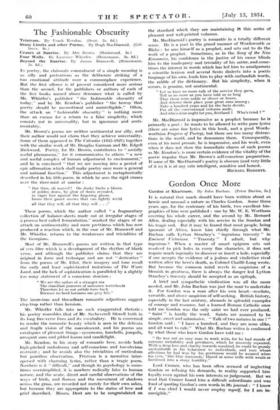Gordon Once More
Gordon at Khartoum. By John Buchan. (Peter Davies, 5s.) IT is natural that much should have been written about so heroic and unusual a nature as Charles Gordon. Some three years ago, for the centenary of his birth, two excellent bio-- graphies of him were published : one by Mr. W. E. Wortham
covering his whole career, and the second by Mr. Bernard Allen, dealing especially with his service in the Soudan and his tragic end. But it may be feared that most people, being ignorant of Africa, know him chiefly through what Mr. Buchan calls Lytton Strachey's " ingenious travesty " in Eminent Victorians. " Travesty " I admit, but why ingenious ? When a master of smart epigram sets out resolved to pick holes in every fine character, it does not require much ingenuity to discover or insert a hole, especially if one accepts the evidence of a jealous and vindictive rival written after the hero's death, as Colonel Chailie-Long wrote. But because the common mind revels in suspicions of a blemish in greatness, there is always the danger lest Lytton Strachey's travesty should be accepted as an epitaph.
A brief and sympathetic vindication was all the more needed, and Mr. John Buchan was just the mart to undertake it. For Gordon was a man after his own heart—resolute, versatile, and above suspicion of self-seeking. British history, especially in the last century, abounds in splendid examples of courage and resource, but a learned Roman Catholic once told me Gordon was the only saint we had ever produced.
" Saint " is hardly the word. Saints are assumed to be simple, sweet and submissive. " Talk of two natures in one ! "
Gordon said ; I have a hundred, and they are none alike, and all want to rule." What Mr. Buchan writes is confirmed by what those who knew Gordon have told me :
" He was not an easy man to work with for he had moods of extreme irritability and petulance, which he sincerely repented. With a deep love and charity towards mankind, he could be grossly uncharitable in his behaviour to individuals, and men whose affections he had won by his gentleness would be :amazed when his eyes, ` like blue diamonds,' blazed at some trifle with wrath or hardened into a stony hostility.".
Lord Cromer, who has been often accused of neglecting Gordon or refusing-his demands, in reality supported him loyally even against his own interests or judgement. But we read that Cromer found him a difficult subordinate and was
fond of quoting Gordon's own words in Ms journal " I know if I was chief I would never employ myself, for I am in.- corrigible." Certainly he was a mystic. He always strove after com- munion with the unseen, but he was possessed with a spirit of ambition, not for place or honours, but for action in which his whole genius might find scope. Mr. Buchan cleverly draws parallels from our earlier history. Gordon, we are told, had none of Cromwelrs agonies of estrangement, those tortures which are the fate of subtler and profounder spirits. His religion was more like that of Major-General Thomas Harrison, who walked confidently through life, looking forward happily to the command of the left wing at Arma- geddon. At moments of crisis Gordon could hardly suppress his longing to command any wing of Armageddon here below, in this terrestrial sphere. Knowing well his power. he burned to use it to the full. Philanthropy at Gravesend, conjectural exploration in Palestine, or social caresses among the lions of London herds, what were they in comparison with commanl in China or in the desert, or in any other region of Armageddon ?
No wonder such a man puzzled and irritated Mr. Gladstone and John Morley, whose minds were set upon home affairs, Ireland, and the extension of the suffrage. It is less excusable that when the dash across the desert was proposed, Sir Redvers Buller is reported to have observed that " the man was not worth the camels." As in the course of a tragic drama, Mr. Buchan, with no loss of words or useless lamenta- tion, narrates the hesitations in the- Cabinet, and the loss of invaluable time upon the expedition that struggled up the Nile and across the desert for the solitary soldier's relief, and struggled in vain. With fine reserve Mr. Buchan has told the splendid and pitiful story again. It ends with Queen Victoria's cry of Too late ! " the most poignant words in all our history. After a siege of 817 days, one of the noblest examples of our race, standing alone upon the palace steps at Khartoum, had fallen to the spear of an Arab who cried : " 0 cursed one, your time has come ! "
HENRY W. NEVINSON.







































 Previous page
Previous page